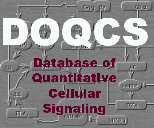
|
Enter a Search String | | Special character and space not allowed in the query term.
Search string should be at least 2 characters long. |
Molecule Parameter List for sGC-ppase* | The statistics table lists the distribution of a molecule acting either as a substrate, product, enzyme or as a molecule within the network.
The text color of a molecule is highlighted by  color. color. | | Statistics |
Accession and Pathway Details | |
| Accession Name | Accession No. | Accession Type | Pathway Link | | cGMP_regulation | 34 | Network |
Shared_Object_cGMP_regulation, GC, PDE | Though Corbin JD. et al. Eur J Biochem. (2000) 267(9):2760-7 has been mentioned in the citation, this model has been made with inputs from different literature sources, each of which has been mentioned in the notes sections. This model features hydrolysis of cGMP by bovine PDE, phosphorylation of PDE by bovine lung PKG, and activation of bovine lung PKG by cGMP binding. These mechanisms are known to be involved in cGMP level regulation. Rates have been used from different sources and the model has been tested based on Corbin JD. et al., since their work involved measuring the PDE phosphorylation and PDE activity.
On replicating Figures 2, 3 and 4 from their paper, there is approx 30% difference in results but the qualitative shape of the curves is very similar. This might be due to the fact that the Vmax values were used from different literature sources. This might lead to the discrepancy in the numbers in this model. The values shown in this model are near estimated physiological levels.In order to replicate the Figures more closely, we have run additional simulations with concentration terms changed so as to replicate the experimental conditions exactly. |
sGC-ppase* acting as a Molecule in cGMP_regulation Network
| Name | Accession Name | Pathway Name | Initial Conc.
(uM) | Volume
(fL) | Buffered | | sGC-ppase* | cGMP_regulation
Accession No. : 34 | GC
Pathway No. : 177 | 0 | 0.0016667 | No | | |
sGC-ppase* acting as an Enzyme in cGMP_regulation Network
| | Enzyme Molecule /
Enzyme Activity | Accession Name | Pathway Name | Km (uM) | kcat (s^-1) | Ratio | Enzyme Type | Reagents | | 1 | sGC-ppase* /
deph_NO2_sGC
| cGMP_regulation
Accession No. : 34 | GC
Pathway No. : 177 | 5 | 1.8 | 4 | explicit E-S complex | Substrate
NO2.sGC_5coord
Product
deph_NO2.sGC
| | | similar to deph_NO_sGC.. | | 2 | sGC-ppase* /
deph_NO_sGC
| cGMP_regulation
Accession No. : 34 | GC
Pathway No. : 177 | 5 | 1.8 | 4 | explicit E-S complex | Substrate
NO.sGC_5coord
Product
deph_NO.sGC
| | | Km and Vmax used from Ferrero et al., J Neurochem, 2000, 75: 2029-2039, and other refs cited in their paper. Though there are no plots in this paper, the rates look ok when the model is being run. Still this part can be improved further based on more experimental observations, since at the moment, there is not much information on the rates and kinetic details of the phosphatase mediated sGC regulation. |
sGC-ppase* acting as a Product of an Enzyme in cGMP_regulation Network
Enzyme Molecule /
Enzyme Activity | Accession Name | Pathway Name | Km (uM) | kcat (s^-1) | Ratio | Enzyme Type | Reagents | cGMP2.PKG /
sGCppase_act | cGMP_regulation
Accession No. : 34 | PDE
Pathway No. : 178 | 0.5 | 12.31 | 4 | explicit E-S complex | Substrate
sGC-ppase
Product
sGC-ppase*
|
sGC-ppase* acting as a Substrate in a reaction in cGMP_regulation Network
| Kd is calculated only for second order reactions, like nA+nB <->nC or nA<->nC+nD, where n is number and A,B,C,D are molecules, where as for first order reactions Keq is calculated.
Kd for higher order reaction are not consider. |
| Name | Accession Name | Pathway Name | Kf | Kb | Kd | tau | Reagents | | deph_sGC-ppase | cGMP_regulation
Accession No. : 34 | GC
Pathway No. : 177 | 20
(s^-1) | 0
(s^-1) | - | - | Substrate
sGC-ppase*
Product
sGC-ppase
| | Rates fixed from the ratio of the inactive and active (phos) form of sGC-ppase. |
| Database compilation and code copyright (C) 2022, Upinder S. Bhalla and NCBS/TIFR
This Copyright is applied to ensure that the contents of this database remain freely available. Please see FAQ for details. |
|
